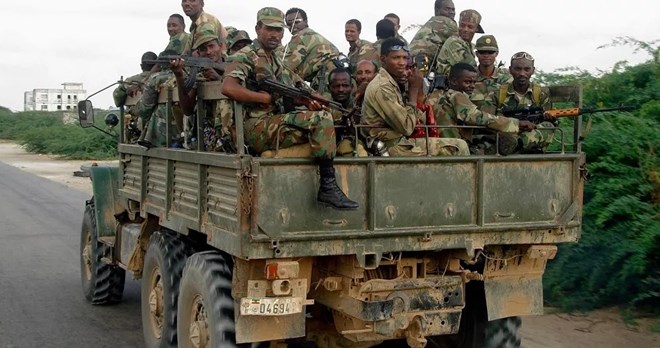
By Harun Maruf
Tuesday June 4, 2024

Somalia expects all Ethiopian troops to leave the country by the end of 2024 as the African Union Transition Mission mandate expires in December, according to Somali National Security Adviser Hussein Sheikh-Ali.
During a recent talk broadcast by a national media outlet, Ali said Ethiopian troops won’t be part of the African Union forces being organized with international partners to secure key installations in Somalia for one year from January 2025.
advertisements
Ali’s comments come amid concerns from Somali regional officials who say the absence of Ethiopian troops could benefit al-Shabab militants.Ali also indicated that Mogadishu’s decision against keeping Ethiopian troops in the region is in response to a controversial January 2024 Memorandum of Understanding signed between Ethiopia and the self-declared Republic of Somaliland.
Somaliland, the fragile nation's breakaway province in the far northwest of the country, has long claimed autonomy and governs from the city of Hargeisa. It has sought recognition since 1991, but the African Union's official policy opposes changes to colonially drawn borders.
The MOU grants Ethiopia leasing rights to the Red Sea coastline in the breakaway region, allowing Ethiopia to build a naval base in return for diplomatic recognition.
Mogadishu vehemently rejects the MOU as a violation of national sovereignty.
“Our position on ENDF's [Ethiopian National Defense Forces] role in the post-ATMIS mission is unequivocal,” Ali posted on X. “As long as Ethiopia persists in violating our sovereignty, territorial integrity, and political independence, we cannot and will not consider it an ally in advancing peace and security in the region.”
Ethiopia currently has thousands of troops operating in Somalia, mainly in the three states of Southwest, Jubaland and Hirshabelle, far from Somaliland. Some of these troops operate as part of the ATMIS mission while others are in the country under bilateral security agreements.
Officials in the Jubaland State where Ethiopian troops are stationed expressed unease about Ali's announcement.
"This will only benefit Kharwarij,” Jubaland Deputy President Mohamud Sayid Aden told VOA’s Somali Service, using Mogadishu’s preferred term for al-Shabab militants.
Calling it an overall “difficult situation,” Aden added: “It’s not a matter that can be agreed upon by the stakeholders.”
Southwest State of Somalia Security Minister Hassan Abdulkadir Mohamed told VOA that Southwest administration officials “are happy with the presence of Ethiopian troops.”
"If ATMIS are going to be removed from the country, it needs to be discussed and no one can make a unilateral decision,” he said. “Southwest is happy to have Ethiopian troops stay."
VOA’s requests for comment on Ali’s statements from Ministry of Foreign Affairs spokesperson Ethiopia Nebiyu Tedla were unsuccessful.
Some observers say Mogadishu’s position poses challenges for Somalia and the African Union.
“I am not sure if this decision has been communicated officially to the AU for them to take the necessary actions,” said prominent Horn of Africa security analyst Samira Gaid.
“The AU has now the additional challenge of mediating between its member states on this post-ATMIS question, after it has been unable to do so on the MOU,” she told VOA’s Somali Service. “So, this can be interpreted as an escalation after 6 months of the MOU being made public.”
Gaid is also unsure if Mogadishu and AU officials will have time to arrange replacement forces.
“The government alluded to existing TCCs [Troop Contributing Countries] taking on that responsibility,” she said.
“However, the likelihood of existing TCCs stepping in, organizing themselves in the remaining time, and operating in Bay and Bakool without clarity on the possible political challenges they would face — and clarity on the wider post-ATMIS questions of resourcing, mandate and numbers — remains to be seen.”
Gaid also said national security and defense falls under Somalia’s federal jurisdiction, and that federal officials don’t appear to have fully digested the potential repercussions of a sudden Ethiopian troop drawdown.
Both AU and Somali officials confirmed that 2,000 peacekeepers will leave the country this month, with 2,000 more departing by the end of September. That will leave some 9,500 remaining AU troops, which Somalia says will be part of the new mission launching in January.
The final troop numbers under the new mission could be as high as 12,000, according to an AU official who asked not to be named because discussions are ongoing. Somalia wants current TCCs — Uganda, Kenya, Burundi and Djibouti — to remain in the new mission.